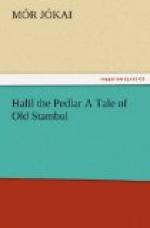“Pulled down they must be, for no righteous man dwells therein. The whole of this Empire of Stone must come down, whoever is so much as a head taller than his brethren is a sinner. Let us raise up those who are lowest of all. Down from your perches, ye venal voivodes, khans, and pashas, who buy the Empire piecemeal with money and for money barter it away again! Let men of war, real men though Fame as yet knows them not, step into your places. The very atmosphere in which ye live is pestiferous because of you. For some time now, gold and silver pieces, stamped with the heads of men and beasts, have been circulating in our piazzas, although, as we all know, no figures of living things should appear on the coins of the Mussulman. Neither Russia, nor Sweden, nor yet Poland pay tribute to us; and yet, I say, these picture-coins still circulate among us. Oh! ever since Baltaji suffered White[16] Mustache, the Emperor of the North, to escape, full well ye know it! gold and silver go further and hit the mark more surely than iron and lead. We must create a new world, none belonging to the old order of things must remain among us. Write down a long, long list, and carry it to the Grand Vizier. If he refuses to accept it, write another in his place on the list, and take it to the Sultan. Woe betide the nation of Osman if it cannot find within it as many just men as its needs require!”
The assembled Mussulmans thereupon drew up in hot haste a long list of names in which they proposed fresh candidates for all the chief offices of the Empire. They put down Choja Dzhanum as the new Kapudan Pasha, Mustafa Beg as the new Minister of the Interior, Musli as the new Janissary Aga; the actual judges and treasurers were banished, the banished judges and treasurers were restored to their places; instead of Maurocordato, who had been educated abroad, they appointed his enemy, Richard Rakovitsa, surnamed Djihan, Voivode of Wallachia; instead of Ghyka they placed the butcher of Pera, Janaki, on the throne of Moldavia; and instead of Mengli Giraj, Khan of the Crimea, Kaplan Giraj, actually present among them, was called to ascend the throne of his ancestors.
Kaplan Giraj pressed Halil’s hand by way of expressing his gratitude for this mark of confidence.
And, oddly enough, as Halil pressed the hand of the Khan, it seemed to him as if his arm felt an electric shock. What could it mean?
But now Musli stood up before him.
“Allow me,” said he, “to go with this writing to the Grand Vizier. You have been in the Seraglio already, let mine be the glory of displaying my valour by going thither likewise! Do not take all the glory to yourself, allow others to have a little of it too! Besides, it does not become you to carry your own messages to the Divan. Why even the Princes of the Giaours do not go there themselves but send their ambassadors.”
Halil Patrona gratefully pressed the Janissary’s hand. He knew right well that he spoke from no desire of glorification, he knew that Musli only wanted to go instead of him because it was very possible that the bearer of these demands might be beheaded.




